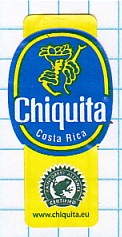The Rainforest Alliance, based in New York and founded in 1987, provides its "forestry, agriculture and carbon/climate clients with independent and transparent  verification, validation and certification services based on these standards, which are designed to generate ecological, social and economic benefits". It also verifies carbon offset projects.
verification, validation and certification services based on these standards, which are designed to generate ecological, social and economic benefits". It also verifies carbon offset projects.
In 1992 the Rainforest Alliance joined with a Costa Rican NGO, Fundacion Ambio, and the giant US-based banana corporation Chiquita, to form the 'Better Banana' project (BBP). At the time Chiquita was "one of the largest agr icultural firms in the world" and "Costa Rica's third largest banana exporter". It was being criticised and facing legal action for the environmental and social impacts of its banana plantations, particularly with regard to its use of pesticides.
icultural firms in the world" and "Costa Rica's third largest banana exporter". It was being criticised and facing legal action for the environmental and social impacts of its banana plantations, particularly with regard to its use of pesticides.
The increase in banana plantations led to a dramatic rise in pesticide use in an area permeated by rivers and creeks that flow into the Caribbean. The new plantations are located near many sensitive forest preserves and conservation areas. Environmentalists are concerned about pollution from pesticides causing fish kills and other environmental problems.
The collaboration was supposed to ensure that Chiquita changed its practices to protect the rainforests and mininise impacts of the banana plantations. By 2000, the BBP had certified over 160 banana farms "covering 120,000 acres in Ecuador, Colombia, Panama, Guatemala, Honduras and Costa Rica", including most of Chi quita's. However critics "claimed that the scheme was an exercise in 'greenwash', and that it did not tackle the most important issues in banana production":
quita's. However critics "claimed that the scheme was an exercise in 'greenwash', and that it did not tackle the most important issues in banana production":
Chiquita's use of pesticides degrades and destroys rainforests and poisons workers, sometimes fatally. Chiquita executives have found that it is far cheaper to pay willing "environmental" organizations to apply their stamp of approval than to pay for cleaning up the problem. Chiquita's environmental cover comes chiefly from its participation in the "Better Banana" program. Chiquita's primary partner in green-washing is the Rainforest Alliance...
According to researcher Jim Bendell, the close relationship between the Rainforest Alliance and Chiquita "to some extent compromised the NGO's role as auditor". It also meant that
the Rainforest Alliance did not require as much evidence of social and environmental improvements as it might, leading to disputes about what BBP had actually achieved. Although incidents of non-compliance with the standard (such as aerial spraying while workers were in the fields) were reported, no 'de-certifications' were made.
Some critics believed that the Rainforest Alliance became financially dependent on Chiquita, and was thus beholden to follow the company's directions. In reality, the relationship was more complex, with the company making donations to the Alliance at the start but then stopping. BBP now charges fees for certification assessments, but remains dependent on additional charitable funding from the Alliance.
By 2000, the BPP had expanded into "one of the largest eco-labeling initiatives in the world, certifying coffee, citrus fruits and bananas...run by a network of NGOs coordinated by the Alliance".
Today the Alliance certifies that coffee, cocoa, tea and bananas have been grown sustainably.

In the case of coffee farms, certification requires that farms show they are planning to meet certain standards that include maintaining or restoring a certain proportion of natural forest cover and trees per hectare, and maintaining buffer zones between cropped areas, where pesticides may be used, and natural vegetation or human-occupied areas. So certified farms do not necessarily meet the standards at present. What is more, to gain certification a product can show the Rainforest Alliance logo even if only 30% of the content comes from certified farms.
In 2010, the Alliance certified Galaxy chocolate (manufactured by Mars Chocolate, UK) for using cocoa sourced from sustainable farms. However this was criticised because the chocolate contained palm oil that is not harvested sustainably but grown in areas of cleared rainforest, habitat of the endangered orangutang in South East Asia. Mars claims it will source its palm oil sustainably from 2015.
In 2010 the Norweigan government hired the Rainforest Alliance to verify Guyana's compliance with a Reducing emissions from deforestation and forest degradation (REDD) agreement. Several organisations that had worked in Guyana and "followed developments there closely for the past decade" criticised the Alliance report for being overly optimistic about Guyana's progress:
Our over‐riding concern is that the Rainforest Alliance report does not provide an accurate picture of progress on the ground. It relies heavily on statements made by government officials and on government documents, rather than on independent verification of those statements, or on the progress of the enabling activities.
The division of Rainforest Alliance that certifies forestry for the Forest Stewardship Council (FSC) was SmartWood. In Australia, Smartwood c ertified controversial Tasmanian forestry group Gunns [subsequently bankrupted] as well as "plantation owners Hancock, tissue company Kimberly Clark and Norwegian paper group Norske Skog, which supplies most newsprint used in Australia."
ertified controversial Tasmanian forestry group Gunns [subsequently bankrupted] as well as "plantation owners Hancock, tissue company Kimberly Clark and Norwegian paper group Norske Skog, which supplies most newsprint used in Australia."
With regard to the certification of Hancock, Anthony Amis of Friends of the Earth suggested in 2008 that SmartWood were "lapdogs for the Australian timber industry...So serious are the implications of Smartwood's latest appraisal of HVP that not only has it raised serious doubts about the ethics of Smartwood, but has raised massive credibility issues with FSC itself."
In 2009, FSC-Watch noted:
Hancock's performance has seriously deteriorated in that time [the past two years] with the company now clearfelling areas supposedly set aside in a rainforest reserve in October 2006. It has been business as usual showing that the FSC system can be undermined by unethical certified companies, with both Smartwood and ASI [Accredited Services International] unable to pull Hancock and their destructive practices into line.
SmartWood's certification of "Australian Paper's use of timber logged from native forests by the Victorian government's logging company, VicForests" (in particular the Reflex brand) led to a complaint being made by environmental groups who argued that Australian native forests should not be certified because of their classification of "high conservation value". Consequently SmartWood temporarily suspended its certification activities in 2011 whilst it retrained its auditors and reviewed its performance. Australian Paper continued to use VicForest logs with certification from the Australian Forestry Standard.